Just A Little Bit of Attention

After I had been there a few minutes, a middle-class-looking family walked in: a little boy who looked to be about four years of age, his mother and father, and a set of grandparents. After they were seated and looking at their menus, the little boy spoke up, "Look, Mommy. These are chairs like my teacher's chair."
No response. The adults in this family weren't talking really; they were just looking at their menus.
"Look, Mommy. These are chairs like my teacher's chair," he said again.
Once more the mother never looked up, and no one said anything.
"Look, Mommy. These are chairs like my teacher's chair."
"Look, Mommy. These are chairs like my teacher's chair."
"Look, Mommy. These are chairs like my teacher's chair. Look, Mommy. These are chairs like my teacher's chair. Look, Mommy. These are chairs like my teacher's chair. Look, Mommy. These are chairs like my teacher's chair. Look, Mommy. These are chairs like my teacher's chair. Look, Mommy. These are chairs like my teacher's chair. Look, Mommy. These are chairs like my teacher's chair. Look, Mommy. These are chairs like my teacher's chair. Look, Mommy. These are chairs like my teacher's chair. Look, Mommy. These are chairs like my teacher's chair. Look, Mommy. These are chairs like my teacher's chair. Look, Mommy. These are chairs like my teacher's chair. Look, Mommy. These are chairs like my teacher's chair. Look, Mommy. These are chairs like my teacher's chair. Look, Mommy. These are chairs like my teacher's chair. Look, Mommy. These are chairs like my teacher's chair. Look, Mommy. These are chairs like my teacher's chair. "
He said it at least that many times. Finally I had had enough. I was frustrated not with the little boy, but with his mother and the rest of this family that were ignoring him for no good reason. So, I turned my chair around to face him, and in the nicest voice I could muster, I looked in his direction and said, "Hey!" in a voice perhaps slightly louder than I intended.
Now I had everyone's attention: the little boy's, his family's and just about every other patron in the place.
Without waiting for the little fellow to respond, I asked, "Are these chairs just like your teacher's chair?"
His face formed into a great big grin, and nodding his head, he said, "Uh-huh!"
And that was it. The constant repetitive phrase was finished. All he had needed was a bit of acknowledgement, just a little bit of attention. I could tell that everyone was still staring at me, but I only turned to the mother to whom I smiled, raised my eyebrows, and then proceeded to turn around to my plate and continue eating.
I know I'm not a parent yet, and I don't want to come across as someone who thinks he can necessarily do it better, BUT I know I want to do it better than them.
Is This Unreasonable?
So this is the email I sent to local ABC television affiliate WHAS11 tonight:
Hey, I really like that new show Pushing Daisies, but you're showing a basketball game (which no one is really interested in) instead. Will Pushing Daisies be aired at a later time? Is this going to become a regular occurrence every time there's a basketball game? Can you show the basketball game at a later time instead?
Yes, I really sent that.
Intelligible Is Not Preferred If the Rendering Is Inaccurate: Matthew 16:18-19 in the TNIV
Our focal text for the day was Matthew 16:13-28. As I do on most Sundays, I was teaching from the TNIV. When I'm teaching, I prefer not to have to undermine the translation I'm using in order to clarify actual meaning in the text. But the TNIV was lacking, in my opinion, in two very important places in our study. Had I been thinking, I probably should have grabbed my HCSB when I walked out the door as it was much better.
First, I'm not fond of the rendering in v. 18: "and the gates of death will not overcome it" (emphasis added). The original NIV simply had Hades here, transliterated from the Greek. On the one hand, hell (KJV, NLT) is too strong of a translation. But in my opinion, the TNIV's death lacks a certain amount of punch. Hades certainly does carry the meaning of death, and at times could be legitimately translated simply as death or grave (Acts 2:27 for instance, although here the TNIV ironically uses "the realm of the dead"). But my concern with death in Matt 16:18 is that the reader will miss the spiritual aspect of Jesus' words. Yes, I know that theologically speaking, all death is a spiritual event. But many don't realize that and merely see it as a physical act at the end of existence.
I perfectly realize that Hades by itself isn't any clearer and many will still need explanation, but again, I feel that death simply doesn't say enough while hell overreaches. I know that many readers will disagree with me and see death as a fine translation. Please realize, I'm not calling it inaccurate, just less effective and incomplete. But that does lead to the next issue where I believe there is an actual inaccuracy in the TNIV (and the majority of translations in use today).
I was disappointed in v. 19 to see that the future perfect aspect of binding and loosing that is in the Greek (δεδεμένον and λελυμένον, respectively) were ignored in favor of a fairly traditional rendering: "whatever you bind on earth will be bound in heaven, and whatever you loose on earth will be loosed in heaven.” But if misery loves company, very few translations render this correctly. In fact, only three major modern translations even attempt to bring out an accurate understanding of the passage:
“...and whatever you bind on earth shall have been bound in heaven, and whatever you loose on earth shall have been loosed in heaven.” (NASB) “...and whatever you bind on earth is already bound in heaven, and whatever you loose on earth is already loosed in heaven.” (HCSB) "Whatever you bind on earth will have been bound in heaven, and whatever you release on earth will have been released in heaven." (NET)
Certainly, the alternatives above are a bit more awkward, but the difference theologically is enormous, and more importantly, they are more accurate. So, since I have said before that "literal is not more accurate if it's unintelligible," I might also suggest that intelligible is not preferred if the rendering is inaccurate.
It cuts both ways.
Final note: alternate (and more accurate) renderings for v. 19 are found in some translations including the ESV and TNIV:
Or shall have been bound . . . shall have been loosed (ESV)
Or will have been. (TNIV)
Nifty Leopard Tricks: Windows Machines on the Network Have a Blue Screen of Death
Here is a screenshot taken of computers on the SBTS library's wifi network. The very top machine listed under shared is a Mac which if highlighted shows an OS X aqua background. But the rest of the computers are Windows machines and if you look closely at the one I selected you'll see it's representing the dreaded blue screen of death indicating a system failure of some kind..
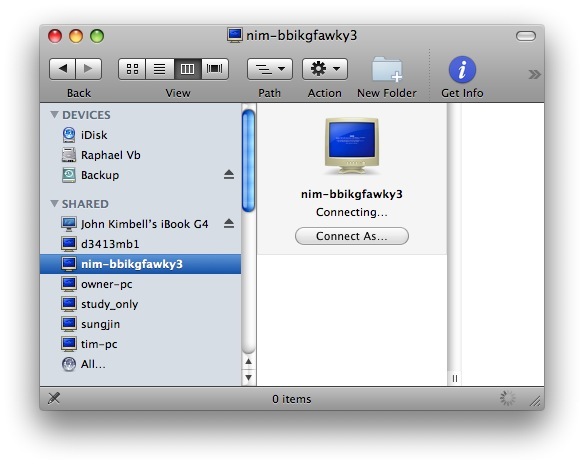
Paul Thurrott calls this "lame and childish" and says that it's hubris on Apple's part since a bug in the installation of Leopard caused some folks to get a blue screen of their own. Personally, I find it simply to be an amusing and friendly jab at Microsoft from Apple. But then again, my installation went smoothly
Oh, and contrary to what the screen above shows, I did NOT connect to someone else's computer. I wouldn't do that without permission!
Nifty Leopard Tricks: Cover Flow
Check out the Cover Flow view of Biblical Illustrator files below. Be sure to click on the image to see it full size.
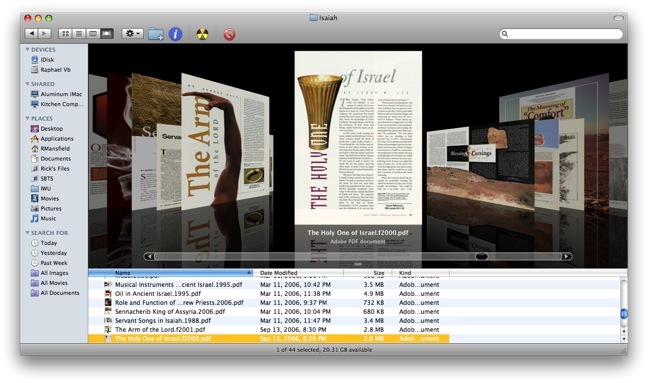
Way cool!
Keeping One's Emotions in Check: Psalm 4:4 in the RSV/ESV
I was teaching the imperative mood in my Greek class today when a question came up about an example I used. To illustrate the idea of an imperative granting permission, I offered the same verse as our textbook, Eph 4:26—
ὀργίζεσθε καὶ μὴ ἁμαρτάνετε
[You may] Be angry and/but do not sin
One of my students asked about the original OT passage that Paul quotes. He wanted to know if it was an imperative in the LXX. It’s true that the passage quotes Psalm 4:4 (4:5 in the LXX/BHS). And although I didn’t know the answer off the top of my head, it was easy enough to find out. So I threw an Accordance window onto the projector screen.
We looked up the passage in the LXX, and sure enough it was exactly the same down to the letter. The same imperative form for ὀργίζω (to be angry) was used in the passage: a present passive imperative, 2nd person plural. Someone looking in his own copy of the Bible noted however, that the NASB did not use “Be angry,” but rather Tremble. I suggested that often such a disagreement occurs because the NT writers usually quoted the LXX, but our modern translations are based off the Hebrew text and sometimes variations occur. Then I threw up a few English translations for comparison, most of which had the same or a similar idea as the NASB. But when I opened a pane with the ESV, I was surprised to see that it said, “Be angry... .”
Having spent enough time on this issue, I went back to our lesson. However, I was curious enough to look at this issue after class. As I was to confirm, the Hebrew for Psalm 4:4/5 is not a word that specifically means to be angry. The Hebrew word used 4:4/5, rigzu, is the qal imperative form of rgz. My Hebrew is in the rustier section of my language toolbelt, but I can still read a lexicon. And according to the HALOT, the qal form of rgz means (1) to tremble, be caught in restless motion, (2) to tremble with emotion: from terror, (3) to come out quaking with fear, (4) to get excited. Although it's not my desire to try to defend the LXX's choice of ὀργίζω for rgz, I can question the ESV's use of "Be angry" since the translation claims to be based on the Hebrew OT, and certainly not the Greek.
I should point out that the ESV does include an alternate translation to "Be angry" in the footnotes: "Or Be agitated." Is Be agitated a better translation? Well, according to the HALOT, only if rgz takes the hifil form (which it does not in Psalm 4).
My first hunch was simply to assume that the ESV translators were once again engaging in the questionable practice of trying to make the OT text conform to NT quotations, something that doesn't always work for reasons I've stated above. However, rather than jump to any sudden conclusions, I decided to check out other translations in the Tyndale tradition, especially the ESV's immediate predecessor, the RSV. After checking with the Tyndale translation, I was reminded that there is no Tyndale version of the Psalms (at least that's survived), so it's probably more accurate to say in the KJV tradition. The chart below demonstrates the variations of Psalm 4:4 in all translations that trace their lineage in one way or another to the KJV.
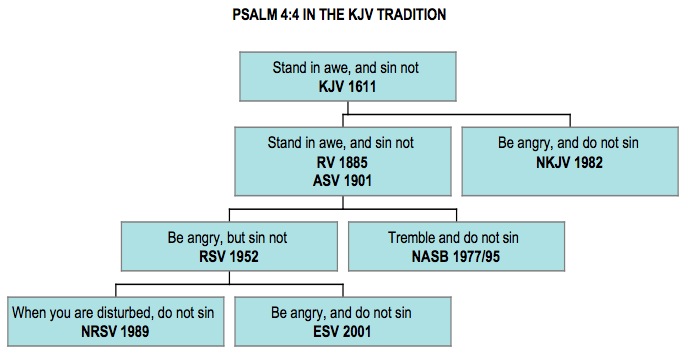
It's very interesting that while the KJV followed the Hebrew, it was the RSV that first departed and followed the LXX instead. I find this highly ironic since the RSV was heavily criticized by conservatives for following the Hebrew reading in Isa 7:14 instead of the LXX which harmonized with Matt 1:23. So I believe it's fair to say that initial fault does not lie with the ESV, but with the RSV. And I haven't looked at every translation on my shelf, but between the ASV and the RSV, only a couple of translations of any significance stand out: the Moffatt version and the Smith/Goodspeed version. Both of these use tremble. Therefore, as far as I know, it is the RSV that first introduced "Be angry" to Psalm 4:4.
However, the ESV is to be questioned here regardless because the translators have chosen to leave a faulty translation in place for what I can only guess is simply is simply for the sake of artificial harmonization. This follows one of my primary problems with the ESV--that the revisers did not update the RSV enough. Many of the awkward renderings or simply less-than-adequate translations found in the ESV are simply leftover baggage from the RSV.
That the ESV, which was moderately revised again earlier this year, has retained "Be angry" only suggests to me the original assumption I made that the handlers of this version wish to create a direct correspondence, a harmonization, between the OT text and the passages where it's quoted in the NT. This is problematic, though, when it no longer accurately reflections the meaning of the OT texts such as is the case here. Even the alternate translation, Be agitated would be closer to accuracy, but as is often the case with the ESV, the more accurate rendering is in the footnotes and a more "traditional" (even if inaccurate) rendering is in the main text (see for example, the ESV's consistent translation of ἀδελφοί/adelphoi in Paul's writings as "brothers" while noting the more accurate translation of "brothers and sisters" in the footnotes: Rom 1:13; 7:1; 8:12; 10:1; 11:25; 12:1; 15:14; 16:14; 1 Cor 1:10; 2:1; 3:1; 4:6; 6:8; 7:24; 8:12; 11:33; 12:1; 14:6; 15:1; 16:15; 2 Cor 1:8; 8:1; 13:11; Gal 1:2; 3:15; 4:12; 6:1; Eph 6:23; Phil 1:12; 3:1; 4:1; Col 1:2; 4:15; 1 Thess 3:7; 4:1; 2 Thess 1:3; 2:1; 3:1; 1 Tim 4:6; 2 Tim 4:21). One wonders why the more accurate translations wouldn't simply be preferred in the main text? Well, evidently because it flies in the face of tradition.
As always, your thoughts are invited in the comments below. For reference sake, here is Psalm 4:4 in a few other translations. The ESV is not to be criticized by itself. The NLT and HCSB both use anger, which is even more surprising for the latter which usually goes out of its way to shun traditional renderings for the sake of accuracy. Of course "tradition" in this case only dates back to 1956 as far as I can tell. The original NIV also used anger, but the TNIV appropriately corrects this with Tremble.
“Be angry and do not sin” [note: Or Tremble] (HCSB)
“Tremble and do not sin” (GWT)
"So tremble, and sin no more" (JPS)
"Tremble with fear and do not sin!" (NET)
"In your anger do not sin" (NIV)
"Tremble and do not sin" (TNIV)
"Don’t sin by letting anger control you" (NLTse)
"Let awe restrain you from sin" (REB)
"Tremble with fear and stop sinning" (GNT)
CBA Updates Bible Translation Rankings & Method for Rankings [UPDATED]
After an unexplained absence the last couple of months, the Christian Booksellers Association (CBA) has now posted Bible translation rankings for the month of November. Perhaps responding to previous criticisms for the way reports are calculated, the CBA rankings have now been separated into two separate lists: one by dollar sales and one by volume sales.
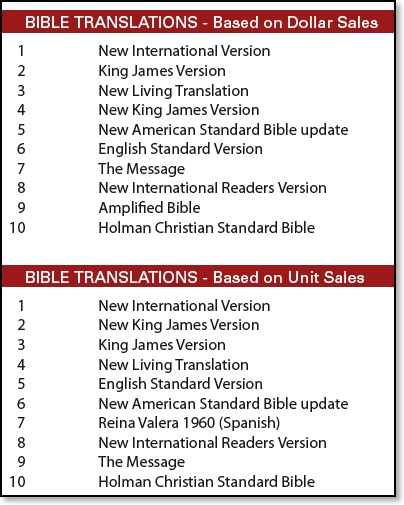
This change is certainly welcome because the two separate lists tell us exactly what we're seeing. Of course, I'd like to see the actual numbers of unit sales as my hunch is probably 75% of all units sold are represented in the first two or three listings. The other issue readers need to keep in mind is that these sale are only reflective of CBA member stores. Thus, significant numbers are not included from such outlets as Wal-Mart, Amazon.com, book chains such as Barnes & Noble and all other non-CBA member businesses.
Leopard Guided Tour

And if that's not enough, check out Apple's page of 316 new features in Leopard.
Regarding Willow Creek's So-Called Repentance...
But I've been amazed at the inordinate amount of attention given today to statements made by Bill Hybels at last summer's Leadership Conference. The word repentance comes not from Hybels as far as I can tell, but from the title of a Christianity Today blog , Out of Ur, in a post called "Willow Creek Repents?" The statement that seems to be getting the most attention is this:
We made a mistake. What we should have done when people crossed the line of faith and become Christians, we should have started telling people and teaching people that they have to take responsibility to become ‘self feeders.’ We should have gotten people, taught people, how to read their bible between service, how to do the spiritual practices much more aggressively on their own.
Well, duh.
But let's be really honest here for a moment. If this is a statement of repentance, can I take the collective planks out of the church's eye for a moment, and simply be the first to say that just about every local body I've ever been a member of, and every church I've ever visited--Baptist, Methodist, WCA, Independent, whatever--should really be ready to repent of the very same thing?
Lot's of folks are having some kind of "Aha!" moment with Hybels' confession. But I would still venture to say that discipleship is seriously neglected (or poorly implemented) among churches of all stripes and variations. Program-driven ministry? The vast majority of evangelical churches engage in some kind of program- or event-driven ministry. At least Hybels/Willow Creek is willing to admit there's a problem.
3rd Party Apps for the iPhone: Finally
Let me just say it: We want native third party applications on the iPhone, and we plan to have an SDK in developers’ hands in February. We are excited about creating a vibrant third party developer community around the iPhone and enabling hundreds of new applications for our users. With our revolutionary multi-touch interface, powerful hardware and advanced software architecture, we believe we have created the best mobile platform ever for developers.
It will take until February to release an SDK because we’re trying to do two diametrically opposed things at once—provide an advanced and open platform to developers while at the same time protect iPhone users from viruses, malware, privacy attacks, etc.
I want just two things: Pocket Quicken and a robust Bible app with access to the original languages. The screen on the iPhone has a much higher resolution than any Palm or Windows Mobile device, so Greek & Hebrew should look incredible...assuming they get Hebrew working on the iPhone, that is...
The downside is that if an SDK is not available until February, it might be a number of months until significant apps are released.
10 Days to Leopard
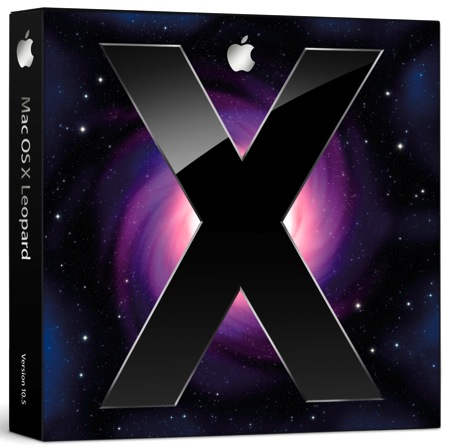
Apple's website has now been updated allowing us to see even more details about the new OS, including what they are counting as 316 new features. Not all of these features are earth-shattering, and some have appeared in various forms on the Linux or Windows platforms, but the release is significant nonetheless.
Final requirements for the new OS are as follows:
- Mac computer with an Intel, PowerPC G5, or PowerPC G4 (867MHz or faster) processor
- 512MB of memory
- DVD drive for installation
- 9GB of available disk space
- Some features require a compatible Internet service provider; fees may apply.
- Some features require Apple's .Mac service; fees apply.
In case you Mac users didn't catch it, G3 processors have been completely cut from the list of computers that will run the lastest OS X, as well as certain G4's such as my Cube which I'm about to put on Craig's List anyway.
I've already been asked if I'm going to stand in line for my copy of Leopard. Well, I'm not, although that would certainly be a fun thing to do. However, ever since the eighties when I began buying software, I've usually been able to receive academic discounts. If I wasn't a student, I was a teacher. If I wasn't either, Kathy was one or the other, so I've always had such access. However, I was disappointed that the academic price of Leopard is only $116, a mere 10% off the regular price of $129. In the past new releases have been $79. I know that folks who pay full price regularly will have no sympathy, but I find it ironic that during Apple's most successful time in the history of the company, they've become the most stingy in their pricing.
The image below shows off the new desktop in Leopard. Notice the new "stacks" feature meant to keep your desktop uncluttered. what I find interesting is that there are no icons on the desktop at all, not even an icon for the main hard drive.
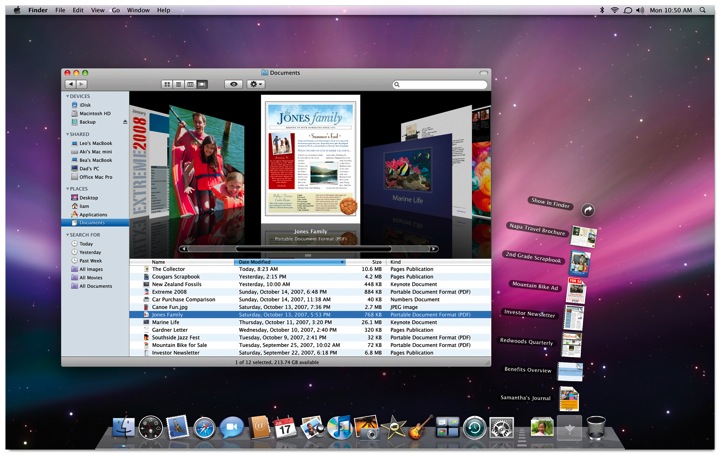
If this is the new default desktop, personally I hope that it can be customized. I'd prefer to have an icon for the hard drive and any other files or application aliases I choose to park there. If memory serves, the original OS X public beta in 2000 did not have a desktop hard drive icon either, but demand from users made Apple change this by the final release in the Spring of 2001. I think Unca Steve just likes clean desktops and wants all of us to appreciate the same. In general, I clean mine up every two weeks or so and either file or delete stray icons. Nevertheless, I'd prefer to have the option for a messy desktop if I want it. A desktop in which a person cannot add any icons at all reminds me of Windows 3.x in which the user could only change the desktop picture.
I'm very intrigued by some of the new features that work with the .Mac service. One of the most valuable aspects of .Mac for my needs is the ability to sync calendars, address books, email, web bookmarks, keychains, and more on any Mac in which I have a login. Even if I am going to use someone else's Mac for a temporary amount of time, I can create my own login, add my .Mac info and within minutes, all my personal information is included on the new machine. Leopard adds further functionality such as syncing dock items, dashboard widgets, notes, and system preferences.
I'm also intrigued by the new "Back to My Mac" feature described as "Connect to any of your Mac computers at home from any Mac on the Internet. Your home computers appear in the shared section of the sidebar. Just click and you’re in." That's really helpful since the 160 GB hard drive on my MacBook gets pretty crowded. Now, I'll be able to leave files on my desktop machine at home and access them from any place I have internet access.
In case you haven't guessed by now, I tend to be an early adopter with these kinds of things. Yes, I know there's always room for disaster, but I backed up all my personal files just this week, and I never add hacks to my system that often are the cause of problem upgrades. Apple's promised to deliver Leopard on the afternoon of the 26th. My MacBook will updated within the hour. If you don't hear from me for a few days afterwards, you can just assume that everything blew up.
Whatever Happened to the CBA Bible Translation Bestseller List?

It's been MIA for two (or is it three?) months now.
I've been watching the list on and off since 1986 when I got my first job in a Christian bookstore. Although it's been quite a while since my last bookstore gig, at various times, I worked at three different companies (including one national chain and two independents, all CBA members), and I used to regularly cut the chart out of the back of the CBA Journal and frame it next to the Bible section.
Of course, no one ever really thought the rankings were overly accurate. I've even had publishing insiders tell me how poorly configured it was. But I had also heard that an improved system was in the works. And now suddenly it's gone! Yet surprisingly, if you follow the link above, the CBA is still tracking other Bible sales. How come they can't track translations anymore?
What have you heard?
"No one seeks God" (Rom 3:11): Is This an Absolute Statement?
Let me briefly lay some cards out on the table for a moment. For many years, I was quite enamored with the so-called "seeker" movement when it came to how I thought churches ought to function in the contemporary world. Yet after experience, study, and reflection, let's just say I'm not quite so enamored these days. In fact, I'd go so far as to say that for a local church to gear nearly all its ministry around the idea of reaching seekers is ultimately a mistake. Nevertheless, I believe there is some value in the seeker movement in that it reminded the church universal that often Christians and non-Christians have very different thought processes. So I believe there must be some balance, and I'll come back to that idea in a separate post later on.
I'm writing this because many times I hear those who are opposed to seeker-targeted ministry quote Rom 3:11, "no one seeks God." Then the conclusion that almost always follows is that there is no such thing as a seeker and thus any ministry to reach seekers is invalid. Well, I believe this is a complete misunderstanding of this verse that lifts a handful of words that Paul somewhat paraphrases from Psalm 14 (or 53) and completely takes them out of context.
Speaking of context, here's the passage from Romans from the TNIV with textual notes referencing OT quotations.
9 What shall we conclude then? Do we have any advantage? Not at all! We have already made the charge that Jews and Gentiles alike are all under the power of sin. 10 As it is written:
“There is no one righteous, not even one;
11 there is no one who understands;
there is no one who seeks God.
12 All have turned away,
they have together become worthless;
there is no one who does good,
not even one.”c
13 “Their throats are open graves;
their tongues practice deceit.”d
“The poison of vipers is on their lips.”e
14 “Their mouths are full of cursing and bitterness.”f
15 “Their feet are swift to shed blood;
16 ruin and misery mark their ways,
17 and the way of peace they do not know.”g
18 “There is no fear of God before their eyes.”hcPsalms 14:1-3; 53:1-3; Eccles. 7:20.
dPsalm 5:9
ePsalm 140:3.
fPsalm 10:7 (see Septuagint)
gIsaiah 59:7, 8.
gPsalm 36:1.
In regard to Rom 3:11, Paul is paraphrasing a bit from what is Psalm 14 in English and Hebrew and Psalm 13 in the LXX. I may be wrong, but I believe he is favoring the LXX over the Hebrew Bible here as in most quotations that he makes. Below is my very literal translation of Psalm 13:2 from the LXX:
From heaven, the Lord bent down to look upon the sons of men to see if there were any who understand or seek after God.
Thus, you can see why I say Paul is paraphrasing a bit. Actually, he tells us the results of God's quest: "there is no one who understands; there is no one who seeks after God."
But is this to be taken absolutely? I mean, isn't the Bible full of references to people seeking God? I ran an entirely non-academic search by simply using Accordance to search the NASB for the string, seek*. Here are the results as I have categorized them:
Commands to Seek the Lord |
References to Those Who Seek the Lord |
References to Those Who Will One Day Seek the Lord |
Deut 4:29 “But from there you will seek the LORD your God, and you will find Him if you search for Him with all your heart and all your soul. Deut 12:5 “But you shall seek the LORD at the place which the LORD your God will choose from all your tribes, to establish His name there for His dwelling, and there you shall come. 1 Chr 16:11 Seek the LORD and His strength; 1 Chr 22:19 “Now set your heart and your soul to seek the LORD your God; arise, therefore, and build the sanctuary of the LORD God, so that you may bring the ark of the covenant of the LORD and the holy vessels of God into the house that is to be built for the name of the LORD.” 2 Chr 14:4 and commanded Judah to seek the LORD God of their fathers and to observe the law and the commandment. 2 Chr 15:12 They entered into the covenant to seek the LORD God of their fathers with all their heart and soul; Ps 105:4 Seek the LORD and His strength; Isa 55:6 ¶ Seek the LORD while He may be found; Amos 5:4 ¶ For thus says the LORD to the house of Israel, Amos 5:6 “Seek the LORD that you may live, Zeph 2:3 Seek the LORD,
|
1 Chr 16:10 Glory in His holy name; 2 Chr 11:16 Those from all the tribes of Israel who set their hearts on seeking the LORD God of Israel followed them to Jerusalem, to sacrifice to the LORD God of their fathers. 2 Chr 15:12 They entered into the covenant to seek the LORD God of their fathers with all their heart and soul; 2 Chr 26:5 He continued to seek God in the days of Zechariah, who had understanding through the vision of God; and as long as he sought the LORD, God prospered him. 2 Chr 30:19 everyone who prepares his heart to seek God, the LORD God of his fathers, though not according to the purification rules of the sanctuary.” 2 Chr 34:3 For in the eighth year of his reign while he was still a youth, he began to seek the God of his father David; and in the twelfth year he began to purge Judah and Jerusalem of the high places, the Asherim, the carved images and the molten images. Ezra 6:21 The sons of Israel who returned from exile and all those who had separated themselves from the impurity of the nations of the land to join them, to seek the LORD God of Israel, ate the Passover. Ezra 8:22 For I was ashamed to request from the king troops and horsemen to protect us from the enemy on the way, because we had said to the king, “The hand of our God is favorably disposed to all those who seek Him, but His power and His anger are against all those who forsake Him.” Job 5:8 ¶ “But as for me, I would seek God, Ps 9:10 And those who know Your name will put their trust in You, Ps 22:26 The afflicted will eat and be satisfied; Ps 27:8 When You said, “Seek My face,” my heart said to You, Ps 34:10 The young lions do lack and suffer hunger; Ps 40:16 Let all who seek You rejoice and be glad in You; Ps 63:1 ¶ O God, You are my God; I shall seek You earnestly; Ps 69:6 May those who wait for You not be ashamed through me, O Lord GOD of hosts; Ps 69:32 The humble have seen it and are glad; Ps 70:4 ¶ Let all who seek You rejoice and be glad in You; Ps 105:3 Glory in His holy name; Ps 122:9 For the sake of the house of the LORD our God, Prov 28:5 Evil men do not understand justice, Isa 51:1 ¶ “Listen to me, you who pursue righteousness, Isa 58:2 “Yet they seek Me day by day and delight to know My ways, Lam 3:25 The LORD is good to those who wait for Him, Dan 9:3 So I gave my attention to the Lord God to seek Him by prayer and supplications, with fasting, sackcloth and ashes. Zech 7:2 Now the town of Bethel had sent Sharezer and Regemmelech and their men to seek the favor of the LORD,
|
Jer 50:4 ¶ “In those days and at that time,” declares the LORD, “the sons of Israel will come, both they and the sons of Judah as well; they will go along weeping as they go, and it will be the LORD their God they will seek. Hos 3:5 Afterward the sons of Israel will return and seek the LORD their God and David their king; and they will come trembling to the LORD and to His goodness in the last days. Zech 8:21 ‘The inhabitants of one will go to another, saying, “Let us go at once to entreat the favor of the LORD, and to seek the LORD of hosts; I will also go.” Zech 8:22 ‘So many peoples and mighty nations will come to seek the LORD of hosts in Jerusalem and to entreat the favor of the LORD.’ Acts 15:17 SO THAT THE REST OF MANKIND MAY SEEK THE LORD, |
Obviously, there's record in the Scriptures of those who seek God, regardless of how imperfectly they perform the task. One discovery that's immediately apparent by the above listing is that those who are referenced as seeking God are those who are believers, those who are part of the people of God, those who are part of the covenant already. These individuals are the seekers. That's somewhat different from the way seeker is used in church discussions today in which a seeker is thought of to be the person who has become dispositioned (is this a word?) toward the idea of God, but simply hasn't settled enough issues to claim any kind of spiritual allegiance to a religious philosophy. Based on the examples above, I find it difficult to find the contemporary idea of a seeker in the Scriptures. Perhaps it might be found in 2 Chron 34:3 listed above, in which Josiah has a certain point in life in which he begins to seek the Lord. Four years later he is shown to be an individual who takes obedience to the Lord quite seriously. Perhaps also, inherent in some of the commands to seek the Lord, are those who may not be seeking him to begin with.
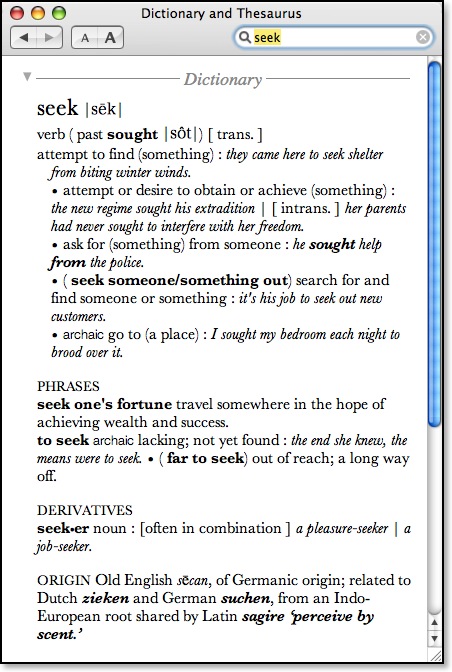
Obviously, in Romans, Paul is making the case that all are guilty of sin, whether Jew or Gentile. And yes, on the whole, in terms of humanity as a collective, we simply haven't sought God. But that doesn't negate the verses in the middle column above. Psalm 14 (or Psalm 53) serves as a contrast between the fool who doesn't seek God, and the faithful person who does. It's been demonstrated many times in recent years, that when Paul quotes a short passage of scripture, especially a string of short passages as he does in Rom 3:9-18, those passages are intended to be representative of the greater context from where they are found.
I don't always agree with James Dunn when it comes to the book of Romans, but I believe he's absolutely correct when, in the Word Biblical Commentary (p. 150), he writes,
Next the catena draws on Pss 14:1-3 [LXX 13:2-3] and 53:2-3 [LXX 52:3-4]. Significantly, it is "the fool" who is indicted, and those described are set over against God's people, "the righteous generation" (Ps 14:4, 5, 7), those who do seek after God (cf Pss 9:10; 22:26; 24:6; 27:8, etc. ... But when used as an elaboration of Eccl 7:10 [Dunn surely means 7:20 here], according to the conventions of Jewish interpretation, the Psalm passages can be understood to fill out the universal condemnation of Qoheleth ("the principal method in which the rabbis clarify the sacred text and probe its depths is by recourse to parallel passages"--Bloch, "Midrash," 32). Those who recognized teh quotation (whose repetition in the Psalms would make it all the more familiar) would recognize too the shocking implication that Paul was in effect lumping Jewish presumptions with gentile idolatry and sexual perversion (cf. Ps 14:1) as equally an expression of the fool's denial of God. ἠχρεώθησαν is the LXX translation of [ne’elachu], "become sour" (of milk)--hence NJB: "all alike turned sour."
Thus, to argue against so-called "seeker-sensitive" churches by quoting Rom 3:11 is to do an injustice to the text. We should remember, however, that our modern conception of a seeker may not square with the biblical definition of one.
Further, I believe it is incumbent upon the church to proclaim the εὐαγγέλιον (good news) every time we meet. And if that's not seeker-sensitive (that is, has the actual good of the seeker in mind, regardless of how we define seeker), I don't know what is.
New Café Press Designs: Greek Uncials, Odysseus, Belshazzar, Halo 3, Latin Sayings, Erasmus and more...
And by the way, I've set up more than just shirts. Most of the designs are available with mugs, totebags, bumper stickers, journals, and more.
Servant of Christ Jesus (Greek Uncial)
In Romans 1:1 and Philippians 1:1, the Apostle Paul refers to himself as a doulos Christou Iesou, which is translated "servant [or bondslave] of Christ Jesus."
The design in this section uses an uncial Greek font which is indicative of the time when the New Testament documents were actually written. Shorthand versions of holy names, called "Nomina Sacra" were employed in these manuscripts with lines on top of a two letter abbreviation. What looks like XY and IY is actually the genitive form of the Nominative Sacra of Χριστοῦ Ἰησοῦ or "Christ Jesus."
Servant of Christ Jesus (Greek Standard)
The concept of this shirt is the same as the one above, but the design for this shirt uses a standard Greek font and the accepted presentation found in critical editions of the Greek New Testament.
Odysseus Is My Homer-Boy
This is another take off on the "[Insert Historical Figure Here] Is My Homeboy" designs. If you don't get the pun, you need to take remedial high school English.
The Doom of Belshazzar
Daniel 5 tells the story of Belshazzar, ruler of Babylon, who in a bout of drunkenness insulted the God of Israel.
This shirt has two sides. The first side contains the Hebrew words that God wrote on the palace wall: MENE, MENE, TEKEL, UPHARSIN.
The back side of the shirt contains the interpretation of God's words given to Belshazzar by the prophet Daniel:
MENE--
God has numbered the days of your kingdom and brought it to an end.
TEKEL--
You have been weighed in the balance and found wanting.
UPHARSIN--
Your kingdom has been divided and given to the Medes and Persians.
The words on the front side of the shirt are in Hebrew, and the back side of the shirt includes Daniel's interpretation from Dan 5:26-28 in a handwritten-style (of course!) font. The wording on the back is adapted from the Revised English Bible.
Unfortunately, this shirt's a bit pricier because it has designs on both front and back. Nevertheless, where else would you possibly find a shirt as cool as this?
John 117 Lives
"John 117 Lives" is a takeoff on the "Frodo Lives" bumper stickers, buttons and shirts of the late 1960's. My apologies if I just spoiled the ending of the story for anyone.

I first read the Latin phrase MORS CERTA, VITA INCERTA not on some ancient Roman inscription, but rather in Philip K. Dick's book Do Android's Dream of Electric Sheep (the basis for the movie Blade Runner).
The phrase means "death is certain; life is uncertain." I've always been struck by how this statement is so brief, yet so profound. It's what separates us from the animals: we know we are mortal and are heading toward an end. In reality, this is the only thing that is constant in life. Everything else may be predicted, but never guaranteed.
I've often suggested that MORS CERTA, VITA INCERTA would make a great epitaph on my tombstone one day--a reminder to those who remain to live life to the fullest, but never to take anything for granted.
Erasmus on Buying Books
Desiderius Erasmus of Rotterdam (October 27, 1466 - July 12, 1536) was a theologian responsible for the first published critical editions of the Greek New Testament, the ones used by both Martin Luther and William Tyndale in their translations.
Further, there's a great quote attributed to Erasmus in which he purportedly said, "When I get a little money I buy books; and if any is left I buy food and clothes."
Some of the items have the quotation to the right of the image of Erasmus, while the items further down are Erasmus alone.
I hope that you'll find these little designs amusing or intriguing enough to pick up for yourself.
You can visit the This Lamp Café Press store at http://www.cafepress.com/thislamp
And Kathy has gotten in on the act by starting a Café Press store related to our upcoming adoption. Be sure to check out http://www.cafepress.com/kolloquy
One More Step On the Road to Robots Making Us Batteries: My Xbox Is Writing His (Its?) Own Blog
I've got a new blog. Well, technically, I don't... my Xbox does. Yeah. Really.
Well, kinda.
The folks over at 360voice.com allow folks to submit gamer tags and then narrative voice is given to the Xbox 360 owner's latest activity (assuming there is an Xbox Live account). The perspective of the narrative is from the Xbox itself which is very intriguing, if not a bit cheesy at times. In fact, he (my Xbox) tends to whine a bit on the days I don't play anything. There's even a place for comments.
And evidently, besides all this existing as a very interesting, but unusual gimmick, there's a bit of cutting edge computer AI stuff associated here. From the About page at 360voice.com:
How did you come up with the idea for your site?
As a member of the Xbox Community Developer Program, Steve had access to the live gamer feeds and was playing around with the data. I attended the O'Reily Emerging Technologies conference where I heard Bruce Sterling give a keynote about blogjects (a term coined by Julian Bleecker)... futuristic objects that write "blogs" about their interactions with the world and other devices just like humans write about their interactions with the world and other people. In discussing this keynote with Steve, it didn't take long for us to see how this academic concept could relate to the Xbox 360, albeit in a much more scaled back fashion. We got quick prototype of the idea up and running in a few days. The response from the prototype was so huge that we immediately developed it into a full blown product which became 360voice.com.
So, yes it's all very weird, but somehow still I have to go look and see what my Xbox has written for the day--even after days when I've played nothing.
By the way, my Xbox will refer to me in his posts under my gamertag name, Borofaxx. I got that name from the cream of the same name that my mom used to put on my cuts and scrapes when I got hurt as a child (and she put it on diaper rash when I was an infant, but that's probably more than you want to know). I'm pretty sure it's no longer being produced (we all have Neosporiin now!), so I thought the name would make a good and unusual gamertag. And of course I added the extra X at the end because that makes any word or name cooler.
One last thing. Sometime my Xbox is...frankly.. a liar. No, I don't mean about my gamer score. Take for instance the statement he attributed to me on October 5. It's simply not true. I have chosen not to use that particular word.
Feel free to check it out (and even leave a comment) if you want at http://www.360voice.com/tag/Borofaxx.
TNIV Truth: Can the TNIV Be Used for "In-Depth" Study?
Can someone please explain to me how you can use the TNIV for in-depth study? I love the TNIV, but I am having a hard time using it for deep study because of the dynamic equivalence. I don't know if this is a mindset or an actual problem.
To read my response, click here.
The Apple Key Is Dead (13 years late); Long Live the (solo) Command Key

Apple has a history of changing its basic tools of user interface--namely the keyboard and mouse--and letting the fallout of controversy land where it may. The totally redesigned ultra thin keyboard that accompanies the new aluminum iMacs is no exception. Mac users either love it or hate it. I've spent a little bit of time with one, and I'm a bit undecided. However, I'm also a big fan of the Matias Tactile Pro keyboard, and if you know what that is, you know it's very different from Apple's new keyboard.
And yet in the changes that have come with the new aluminum keyboard, one alteration that I've seen get a little attention, but not much, is the removal of the Apple logo from the Command key:

Note that the Apple logo has been completely removed from the Command key and now this key is labeled like the the control and option keys are. Incidentally, over the years, I've heard the Command key called the "Apple key" (Kathy tends to do this), but I've tried to avoid it myself since all manuals and instructive literature from Apple have used Command. However, when trying to help folks who have switched to the Mac from Windows, I would get blank stares when I said, "Hit the Command key," and inevitably, I'd resort to "or the Apple key."
But here's the question of point to this post: how come the Macintosh keyboard had both the Apple symbol and the Command symbol to begin with?
Technically, the question itself is a misstatement since the original 1984 Mac 128K keyboard did not have the Apple symbol on the Command key, although the Command key and Option keys were indeed there. The keyboard layout is essentially the same today except that the original Mac didn't have a Control key.
Over the years, I've heard various explanations about the origins of that "butterfly" looking Command symbol (it's not really a butterfly), but I'd never heard why the Command key had an Apple on it, too (up until the new aluminum keyboard, that is). And then I stumbled across the answer yesterday. I was reading a January, 1989 (yes, you read the year right) issue of the now defunct magazine (at least in the U.S.) MacUser. In the section called "The Help Folder," Chris Espinosa was asked this very question.
As an aside, Espinosa has been an employee of Apple since the days that it was in Jobs' parents' garage, and he still works there today. Further, he was part of the original Macintosh team, so even in 1989, he was the perfect one to answer this question. This is all nothing more than Apple Trivia, of course; but nevertheless it's interesting. I'll reproduce the question and Espinosa's answer from the original January, 1989, MacUser magazine below. The bracketed note in the question is mine, but the bracketed note in the answer belong to the 1989 MacUser editor.
Q. What does the funny symbol on the Command key mean? And why is there an Apple symbol next to it on the new keyboards [Rick's note: keep in mind the reader is asking about the keyboards that were new in 1989!].
A. On the Apple III way back in 1980, we put two Apple keys on the keyboard for programs to use as they wished. We put an Apple key on the Apple IIe's keyboard when we introduced it in 1983. In 1983 the Command key on the Lisa keyboard also had the Apple symbol on it.
The Macintosh was going to use the same symbol and have the Apple symbol in the menu for the Command-key equivalent, just like the Lisa. But late in 1983, somebody (I bet you can guess who) decided that using the Apple symbol on the keys and in menus was "corrupting the logo"--sort of like those rare Britons who don't lick postage stamps because they don't approve of spitting on the back of the Queen's head. So we had to change the keyboard and the software and the documentation all in a very short period.
But first we had to come up with a good Command key symbol. The requirements were pretty heavy: It had to be small, recognizable, unique, and easily rendered in a simple font character (for the menu), an it had to mean "command." The International Standards Organization (ISO) book of symbols offered little help (its recommendations for the Shift and Option keys can be see on Apple's non-American keyboards).
Finally Susan Kare and Barbara Koalkin found the symbol that's now affectionately known by many names: flower, propeller, freeway, splat, command, feature, and cloverleaf [Don't forget butterfly.--Ed]. It came from a book of Swedish campground trail markers and means "remarkable feature!"
The Apple symbol came back with the introduction of the ADB (Apple Desktop Bus). Now that Apple keyboards are interchangeable among many Apple computers, that key has to do double duty: It's the Command key on the Macintosh family and the Apple key on the Apple IIGS.
So there you have it. They key served two different platforms, and it was legitimately the Apple key or the Command key based on what computer one was using--back when people were using Apple II's that is. However, I find it interesting that Apple discontinued the Apple II platform in 1994 (when it was already way past its prime), but didn't get around to removing the Apple symbol until 2007. That's 13 years late! And isn't it odd that the Apple symbol was retained even on the USB keyboards in spite of the fact that Apple II's were discontinued well before the creation and adoption of the USB standard. I suppose the Apple symbol was retained because that was what people were used to, even if hardly anyone knew why it was there anymore. Can anyone say, "Meaningless tradition"?
Regardless, now it's gone, and better late than never, I suppose. So...
The Apple key is dead!
Long live the Command key!
TNIV Truth: Dig Deeper
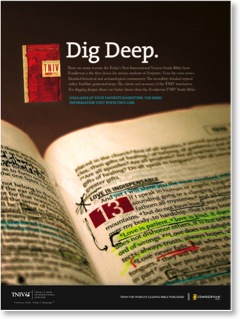
To read why I like this ad for the TNIV Study Bible, as well as my thoughts on work still to be done, read my latest post at TNIV Truth.


















